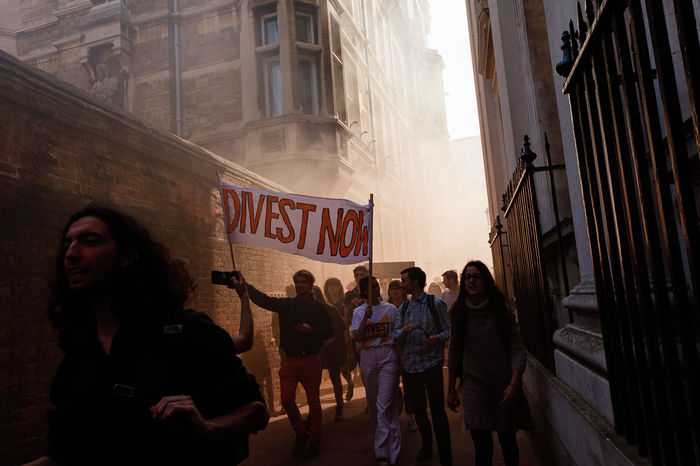Extinction Rebellion march through Cambridge marking the beginning of their ‘Summer Rebellion’
Extinction Rebellion activists marched from Senate House today, with a number of protesters arrested outside of Trinity and Caius, marking the beginning of the climate activists group’s summer rebellion

Extinction Rebellion (XR) activists, from the “East of England and beyond”, marched through Cambridge today (28/08), to mark the start of their summer rebellion, demanding that the University and its colleges divest from “fossil fuels and other environmentally destructive companies.”
The ‘oily handed divestment’ march attempts to highlight “the government’s continued inaction on the climate and ecological emergencies”. Alongside the march in Cambridge, the rebellion began with coordinated banner drops across the East of England.
The march, which had an estimated turnout of 100, is an attempt to draw attention to the University and colleges’ “huge power and wealth” which they are using “to prop up the industries that are destroying our planet.”
The march commenced outside Senate House, with activists visiting some of the University’s 24 non-divested colleges along their route.
Some climate activists marched with their hands covered in fake oil while other activists dressed as the all too familiar ‘divestment dinosaurs’ and ‘red rebels’.

XR protesters, who marched to a continuous drum beat, carried banners which wrote 'BUSINESS AS USUAL IS KILLING US' and 'NO MORE EXCUSES: DIVEST NOW'.
At the end of the march, more than 10 climate activists - including several University alumni and former staff members, according to an XR press release - used black chalk spray to stencil their hands on the outside of Trinity college and Senate House, symbolising “both institutions ‘oily hands’ due to their huge unethical investments in the fossil fuel industry.”
Five people were arrested outside of Trinity this afternoon (28/08) as a result of their involvement in the direct action; four for criminal damages caused by the chalk spray painting and another individual was arrested for suspicion of committing criminal damage. Meanwhile, at least three people were arrested outside of Gonville & Caius and one person was also arrested outside of Christ’s on charges which are not yet known to Varsity.
Regarding the criminal damage, one of the XR activists explained: “We are resorting to such drastic action because, despite years of tireless campaigning by groups and individuals across multiple sectors of society, including staff and students, the University is yet to take any concrete steps towards withdrawing the over £400 million it has invested in the fossil fuel industry, and only 2 of the 31 constituent colleges have committed to full divestment.”

Similarly a protester from the youth wing of XR asked how the University could “care about the exteriors of its buildings but not the land already being lost to the sea or made uninhabitable by rising temperatures, extreme weather events and pollution?”
The youth activist emphasised the necessity of holding the University “accountable” and forcing “it to look beyond its own doorstep when it decides what is worth protecting.”
Climate activists may finally see their efforts come to fruition in the upcoming months as the University will be releasing their latest divestment report on September 21st with a hearing scheduled for October 19th whereby the University Council will vote on whether the University should divest or not.
XR Cambridge has targeted the University and its non-divested colleges throughout August after their divestment deadline of the end of July was not met. XR has committed to continued action until the University and all its colleges fully divest from fossil fuels and all “ecocidal industries”.
At the beginning of XR’s campaign only two colleges - Clare Hall and Queen’s - were entirely divested, while a further five - Selwyn, Emmanuel, Downing, Peterhouseand Jesus - were partially divested.
However, since XR’s direct action campaign Newnham, Robinson, St John’s and Fitzwilliam have all publicly announced, for the first time, that they are partially divested from fossil fuels. While King’s and Gonville & Caius hold no direct investments in fossil fuels, neither college will rule out holding them in the future.
Although their direct action campaign did not influence any of the college’s decisions to divest, it is likely that XR has forced colleges to be more open with their investment policies.
The march in Cambridge marks a day of action particularly targeted at fossil fuels, while subsequent days are themed around airports and aviation, community and ‘Money Monday’.
Following the action in the East of England, protestors will join other XR activists in London at the beginning of September for socially distanced protests as Parliament returns to session.
 Comment / Cambridge’s tourism risks commodifying students18 April 2025
Comment / Cambridge’s tourism risks commodifying students18 April 2025 News / Cambridge student numbers fall amid nationwide decline14 April 2025
News / Cambridge student numbers fall amid nationwide decline14 April 2025 News / Greenwich House occupiers miss deadline to respond to University legal action15 April 2025
News / Greenwich House occupiers miss deadline to respond to University legal action15 April 2025 Comment / The Cambridge workload prioritises quantity over quality 16 April 2025
Comment / The Cambridge workload prioritises quantity over quality 16 April 2025 Sport / Cambridge celebrate clean sweep at Boat Race 202514 April 2025
Sport / Cambridge celebrate clean sweep at Boat Race 202514 April 2025





